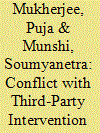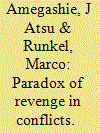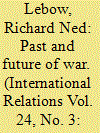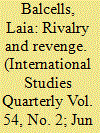|
|
|
Sort Order |
|
|
|
Items / Page
|
|
|
|
|
|
|
| Srl | Item |
| 1 |
ID:
192048


|
|
|
|
|
| Summary/Abstract |
Most real-world conflicts are characterised by the presence of third-party interventions as well as prolonged and revengeful violent interactions between the conflicting parties. However, most of the conflict literature studies the impact of each of these forces – third-party intervention and revenge motivations – on the conflict, in isolation from each other. This paper attempts to fill in this gap and aims to explore the impact of these two forces acting in conjunction with each other on a conflict situation. In fact, we also endogenise the intervention decision of the third party and explore parametric restrictions under which a third party decides to intervene (either as an ally of one of the conflicting parties or as an ‘idealist’ aiming to reduce overall conflict levels) and its repercussions on associated conflict levels. We also present narrative evidences of some real-life conflicts that amply exhibit the two forces of third-party intervention and revenge.
Peace is the only battle worth waging. – Albert Camus
|
|
|
|
|
|
|
|
|
|
|
|
|
|
|
|
| 2 |
ID:
151650


|
|
|
|
|
| Summary/Abstract |
The extrajudicial killing of Osama bin Laden (OBL) on 2 May 2011 was greeted with jubilation in the United States. The dominant interpretation of the event – expressed in US media, by US political elites, and on the streets of US cities – was that justice had been served on the perpetrator of the 9/11 atrocity and thereby a great historical wrong had been righted. This article argues that the ‘justice’ deployed was a proxy for revenge, understood as the infliction of harm on those who had inflicted harm on the avenger. The argument is situated in a broader discussion of the emotional topography on which acts of state revenge are politically premised. The bin Laden case is used to explore some issues raised by the growing literature on emotions in politics and International Relations including, most importantly, how emotions are collectivised and made public.
|
|
|
|
|
|
|
|
|
|
|
|
|
|
|
|
| 3 |
ID:
113825


|
|
|
|
|
| Publication |
2012.
|
| Summary/Abstract |
The authors consider a two-period game of conflict between two factions, which have a desire for revenge. It is shown that, in contrast to conventional wisdom, the desire for revenge need not lead to escalation of the conflict. The subgame-perfect equilibrium is characterized by two effects: a value of revenge effect (i.e., the benefit of exacting revenge) and a self-deterrence effect (i.e., the fear of an opponent's desire to exact revenge). The authors construct examples where the equilibrium is such that the self-deterrence effect paradoxically outweighs the value effect and thereby decreases the factions' aggregate effort below the level exerted in the no-revenge case. This paradox of revenge is more likely, the more elastically the benefit of revenge reacts to the destruction suffered in the past and the more asymmetric is the conflict. The authors discuss the implications of revenge-dependent preferences for welfare economics, evolutionary stability, and their strategic value as commitment devices.
|
|
|
|
|
|
|
|
|
|
|
|
|
|
|
|
| 4 |
ID:
099795


|
|
|
|
|
| Publication |
2010.
|
| Summary/Abstract |
An original data set of wars from 1648 to the present indicates that security and material interest are rarely the principal motives for war for rising, great or dominant powers. These states far more often go to war for reasons of standing. The empirical evidence offers no support for power transition, balance of power, Marxist or rationalist theories of war. The frequency of war between and among rising, great and dominant powers is likely to decline precipitously because the most important motives for war in the past - standing, security, revenge, material interests and domestic politics - are, for the most part, no longer served effectively by war. Changes in ideas, not changes in material conditions, are primarily responsible for this transformation.
|
|
|
|
|
|
|
|
|
|
|
|
|
|
|
|
| 5 |
ID:
187353


|
|
|
|
|
| Summary/Abstract |
We allow for the possibility of revenge in attacker-defender conflicts under a variety of settings including, for example, when one of the players faces a no-win situation. In a two-player two-period conflict where revenge stems from the grievances of one of the parties to the original conflict, we show that the presence of revenge can influence the amount of effort devoted to the conflict and may in certain circumstances, exacerbate it. We also give conditions when the presence of revenge can deter an attack altogether.
|
|
|
|
|
|
|
|
|
|
|
|
|
|
|
|
| 6 |
ID:
088006


|
|
|
|
|
| Publication |
2009.
|
| Summary/Abstract |
hen rapturous Germans tore down the Berlin Wall 20 years ago it symbolized far more than the overcoming of an arbitrary boundary. It began an intellectual cycle that saw all divisions, geographic and otherwise, as surmountable; that referred to "realism" and "pragmatism" only as pejoratives; and that invoked the humanism of Isaiah Berlin or the appeasement of Hitler at Munich to launch one international intervention after the next. In this way, the armed liberalism and the democracy-promoting neoconservatism of the 1990s shared the same universalist aspirations. But alas, when a fear of Munich leads to overreach the result is Vietnam-or in the current case, Iraq.
And thus began the rehabilitation of realism, and with it another intellectual cycle. "Realist" is now a mark of respect, "neocon" a term of derision. The Vietnam analogy has vanquished that of Munich. Thomas Hobbes, who extolled the moral benefits of fear and saw anarchy as the chief threat to society, has elbowed out Isaiah Berlin as the philosopher of the present cycle. The focus now is less on universal ideals than particular distinctions, from ethnicity to culture to religion. Those who pointed this out a decade ago were sneered at for being "fatalists" or "determinists." Now they are applauded as "pragmatists." And this is the key insight of the past two decades-that there are worse things in the world than extreme tyranny, and in Iraq we brought them about ourselves. I say this having supported the war
|
|
|
|
|
|
|
|
|
|
|
|
|
|
|
|
| 7 |
ID:
102868


|
|
|
| 8 |
ID:
096686


|
|
|
|
|
| Publication |
2010.
|
| Summary/Abstract |
Recent research on violence against civilians during wars has emphasized war-related factors (such as territorial control or the characteristics of armed groups) over political ones (such as ideological polarization or prewar political competition). Having distinguished between irregular and conventional civil wars and between direct and indirect violence, I theorize on the determinants of direct violence in conventional civil wars. I introduce a new data set of all 1,062 municipalities of Catalonia during the Spanish Civil War (1936-1939) and I show that the degree of direct violence against civilians at the municipal level goes up where prewar electoral competition between rival political factions approaches parity. I also show that, following the first round of violence, war-related factors gain explanatory relevance. In particular, there is a clear endogenous trend whereby subsequent levels of violence are highly correlated with initial levels of violence. In short, the paper demonstrates that an understanding of the determinants of violence requires a theory combining the effect of political cleavages and wartime dynamics.
|
|
|
|
|
|
|
|
|
|
|
|
|
|
|
|
|
|
|
|
|